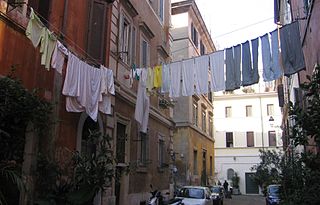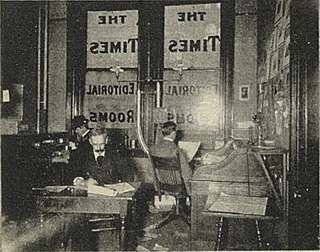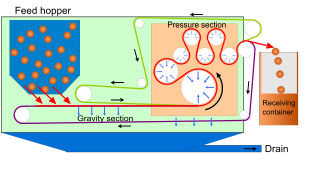Related Research Articles

Laundry is the washing of clothing and other textiles, and, more broadly, their drying and ironing as well. Laundry has been part of history since humans began to wear clothes, so the methods by which different cultures have dealt with this universal human need are of interest to several branches of scholarship.

Editing is the process of selecting and preparing written, visual, audible, or cinematic material used by a person or an entity to convey a message or information. The editing process can involve correction, condensation, organization, and many other modifications performed with an intention of producing a correct, consistent, accurate and complete piece of work.

A washing machine is a machine designed to launder clothing. The term is mostly applied to machines that use water. Other ways of doing laundry include dry cleaning and ultrasonic cleaning.
Search engine optimization (SEO) is the process of improving the quality and quantity of website traffic to a website or a web page from search engines. SEO targets unpaid search traffic rather than direct traffic, referral traffic, social media traffic, or paid traffic.

Washing is a method of cleaning, usually with water and soap or detergent. Regularly washing and then rinsing both body and clothing is an essential part of good hygiene and health.

Leave No Trace, sometimes written as LNT, is a set of ethics promoting conservation of the outdoors. Originating in the mid-20th century, the concept started as a movement in the United States in response to ecological damage caused by wilderness recreation. In 1994, the non-profit Leave No Trace Center for Outdoor Ethics was formed to create educational resources around LNT, and organized the framework of LNT into seven principles.
- Plan ahead and prepare
- Travel and camp on durable surfaces
- Dispose of waste properly
- Leave what you find
- Minimize campfire impacts
- Respect wildlife
- Be considerate of others

Hand washing, also known as hand hygiene, is the act of cleaning one's hands with soap or handwash and water to remove viruses/bacteria/microorganisms, dirt, grease, and other harmful or unwanted substances stuck to the hands. Drying of the washed hands is part of the process as wet and moist hands are more easily recontaminated. If soap and water are unavailable, hand sanitizer that is at least 60% (v/v) alcohol in water can be used as long as hands are not visibly excessively dirty or greasy. Hand hygiene is central to preventing the spread of infectious diseases in home and everyday life settings.
URL redirection, also called URL forwarding, is a World Wide Web technique for making a web page available under more than one URL address. When a web browser attempts to open a URL that has been redirected, a page with a different URL is opened. Similarly, domain redirection or domain forwarding is when all pages in a URL domain are redirected to a different domain, as when wikipedia.com and wikipedia.net are automatically redirected to wikipedia.org.

A car wash, or auto wash, is a facility used to clean the exterior, and in some cases the interior, of cars. Car washes can be self-service, full-service, or fully automated. Car washes may also be events where people pay to have their cars washed by volunteers, often using less specialized equipment, as a fundraiser.

A black fly or blackfly is any member of the family Simuliidae of the Culicomorpha infraorder. It is related to the Ceratopogonidae, Chironomidae, and Thaumaleidae. Over 2,200 species of black flies have been formally named, of which 15 are extinct. They are divided into two subfamilies: Parasimuliinae contains only one genus and four species; Simuliinae contains all the rest. Over 1,800 of the species belong to the genus Simulium.
This is a list of blogging terms. Blogging, like any hobby, has developed something of a specialized vocabulary. The following is an attempt to explain a few of the more common phrases and words, including etymologies when not obvious.
Chunking is a method of presenting information which splits concepts into small pieces or "chunks" of information to make reading and understanding faster and easier. Chunking is especially useful for material presented on the web because readers tend to scan for specific information on a web page rather than read the page sequentially.

A laundry ball or washing ball is a product made of solid, insoluble material promoted as a substitute for laundry detergent. Producers of laundry balls often make pseudoscientific claims about their mechanisms of action and exaggerate the extent of their benefits.
Baby-led weaning is an approach to adding complementary foods to a baby's diet of breast milk or formula. BLW facilitates oral motor development and strongly focuses on the family meal, while maintaining eating as a positive, interactive experience. Baby-led weaning allows babies to control their solid food consumption by "self-feeding" from the start of their experience with food.
Coffee wastewater, also known as coffee effluent, is a byproduct of coffee processing. Its treatment and disposal is an important environmental consideration for coffee processing as wastewater is a form of industrial water pollution.
Martin's Potato Chips Inc is a manufacturer of potato chips, popcorn, and other salted snack foods. Martin's headquarters is located in York County, Pennsylvania, at 5847 US-30 West in Thomasville. The company distributes to retailers in Pennsylvania, and Maryland. It was founded by Harry and Fairy Martin, in 1941.

The Gmail interface makes Gmail unique amongst webmail systems for several reasons. Most evident to users are its search-oriented features and means of managing e-mail in a "conversation view" that is similar to an Internet forum.

The belt filter is an industrial machine, used for solid/liquid separation processes, particularly the dewatering of sludges in the chemical industry, mining and water treatment. Belt filter presses are also used in the production of apple juice, cider and winemaking. The process of filtration is primarily obtained by passing a pair of filtering cloths and belts through a system of rollers. The system takes a sludge or slurry as a feed, and separates it into a filtrate and a solid cake.

Corn wet-milling is a process of breaking corn kernels into their component parts: corn oil, protein, corn starch, and fiber. It uses water and a series of steps to separate the parts to be used for various products.
Toddler nutrition is the description of the dietary needs of toddlers aged one to two years old. Food provides the energy and nutrients that toddlers need to be healthy. An adequate intake in nutrient rich food is good nutrition. A diet lacking essential calories, minerals, fluid and vitamins could be considered 'bad' nutrition. Nutrition needs are different for toddlers. For a baby, breast milk is "best" and it has all the necessary vitamins and minerals. Toddlers typically have been weaned from breast milk and infant formula. Though infants usually start eating solid foods between 4 and 6 months of age, more and more solid foods are consumed by a growing toddler. If a food introduced one at a time, a potential allergen can be identified. Food provides the energy and nutrients that young children need to be healthy. Toddlers are learning to feed themselves and to eat new foods. They should eat a variety of foods from all the food groups. Each day, toddlers need enough nutrients, including
References
- ↑ E-Write. The Bite, Snack and the Meal. Inc. Magazine. 29 June 2001. http://www.inc.com/articles/2001/06/23143.html
- ↑ Leslie O'Flahavan. The Bite, The Snack, And The Meal: How To Feed Content-Hungry Site Visitors. http://www.ewriteonline.com/bite-snack-and-meal-how-to-feed-content-hungry-site-visitors/
- ↑ "Proper Content". Saturday, 17 November 2018
- ↑ Ginny Redish. Letting Go of the Words. Elsevier: 2012. Chapter 7, Section 3, p.134-136.
5. Leslie O'Flahavan writing for WordRake: The “Bite, Snack, Meal” Approach Helps You Feed Content-Hungry Readers.